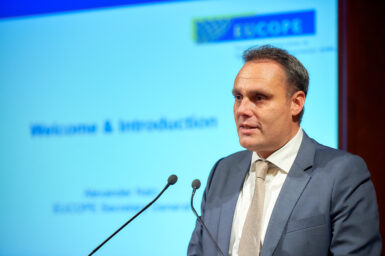One year after Mario Draghi’s competitiveness blueprint, the pharmaceutical sector sits at the back of the scoreboard. None of the nine recommended measures have been delivered. MEP Stine Bosse (Renew/DNK) warns against “halfway” reforms, even if that means resorting to an omnibus fix. João Cotrim de Figueiredo, Portuguese vice-president of the same faction, echoed the urgency: “Dragging on Draghi is dangerous.”
“If you want the real honest answer, I sometimes sit and think, will we need an omnibus? Really? This is how it is. I am not happy with that situation. But, you know, we have to face reality. Instead of becoming scared of what we’re doing, let’s try and get as much done as possible,” Ms Bosse told EU Perspectives.
This is how it is. I am not happy with that situation. — MEP Stine Bosse (Renew, DKK)
Her warning came as the newly launched Draghi Observatory confirmed pharma’s poor showing. For Ms Bosse, the danger is not delay but settling for half-baked reform: “If we can actually get it completely right, let’s do it.” Yet she admits lawmakers may need to return. “If we don’t hit all the nails right spot on, then we will have to sit with it again in a year or two from now, and then adjust that.”
Draghi’s agenda: big vision, little delivery
The Draghi Observatory, a pledge-tracking index monitoring implementation, paints a sobering picture. “This is the overall, this preliminary estimation that we have right now. Eleven per cent of the overall measures, 383 measures, have been implemented, partially 20 per cent. They are in progress, 46 per cent, and not implemented 22 per cent,” said Konstantinos Saravakos, head of research at the Center for Liberal Studies.
Pharma’s results were especially stark: zero fully implemented, just 27.8 per cent partially delivered. That puts it among the weakest performers, alongside energy and space. Mr Draghi urged the EU to speed up drug approvals, harness health data for AI, and expand gene therapy investment. Twelve months later, most of that urgency remains stuck in the “in progress” box.
Transport and critical raw materials are further ahead, though still under 50 percent implementation. Energy and digitalisation are almost at a standstill. Bottom line: Brussels is making plans but failing to deliver, with pharma lagging behind.
You might be interested
“Either we accelerate or we disappear”
Commission Executive Vice-President for Prosperity and Industrial Strategy Stéphane Séjourné seized on the findings. “Either we accelerate or we disappear,” he warned, calling the Draghi report “a call without precedence to mobilisation and also to political courage”.
It is the time to do the cleaning of layers of regulation and bureaucracy that have been superimposed. — Stéphane Séjourné, Commission Executive Vice-President for Prosperity and Industrial Strategy
For Mr Séjourné, the challenge is structural. “The strategy that I presented four months ago is probably already obsolete in ambition,” he admitted in a reflection of the dizzying pace of global change.
He linked the Draghi agenda to Brussels’ simplification drive: “We have already presented six omnibus of simplification, one per month. One on reporting, one on durability, one on agriculture, one on defence, one on chemistry. These are layers of regulation and bureaucracy that have been superimposed … this is the time to do the cleaning.”
Lessons from digital
Luis Garicano, Professor of Public Policy at the London School of Economics, cautioned that Europe cannot repeat in pharma the mistakes it made in digital and AI. “The conventional wisdom on AI is, Europe must build sovereign AI, but let’s do a reality check. The energy is expensive. There’s a small tech ecosystem. The regulatory frameworks are discouraging innovation. We have lost the foundation model and the AI data centre race. Let’s forget about it.”
Instead, Mr Garicano urged Europe to act as a “smart second mover. We have the industrial power, the pharma, automotive. We can do the smart, second mover strategy. Fast. Let’s get the obstacles out.”
The parallel with pharma was clear: “If we don’t get the growth like we didn’t get with the Information and Communication Technology (ICT) revolution, if we don’t get the implementation right, we’re in the worst of all worlds, where we pay the global interest rate and we get the European growth rates,” he insisted.
Reform agenda as a priority
MEP João Cotrim de Figueiredo (Renew/PRT) put the stakes bluntly. “Mario Draghi spoke of an ‘existential threat’ in the foreword of his report (…) One year after the adoption of the report, we are still lacking a sense of urgency. Dragging on Draghi is dangerous,” he said.
One year on, we are still lacking a sense of urgency. — MEP João Cotrim de Figueiredo (Renew/PRT)
Looking to geopolitics, Mr Cotrim de Figueiredo added: “We can lament the Trumps and Putins of this world, but there is little we can do about them. What we can influence is our own reform agenda. If we get fitter, we’ll get stronger, we’ll become players.”
For Ms Bosse, pharma must not become Europe’s next digital failure. “We have to make sure as lawmakers that we are not constantly overtaken by reality,” she said. “So, this is why I’m very mindful of the fact that we have to bear this in mind when we sit with the different pieces of legislation and all the areas where we can actually say, okay, let’s get this perhaps a bit more bold than we thought necessary. Let’s do it.” If the EU cannot move fast enough now, she concedes, an omnibus may be the only way to keep Mr Draghi’s pharma vision alive.











